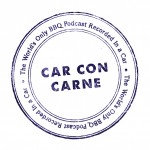Rivet Blog
How should you add music to the end of your piece? Rivet production whiz George Drake, Jr. walks you through some best practices.
I started a podcast in May 2014 called Car Con Carne: The World’s Only Barbecue Podcast Recorded in a Car. The show’s title served as the elevator pitch: It’s a podcast recorded in my car outside barbecue restaurants. Yes, it’s ridiculous, but I believe podcasts should have a distinct position.
The headline says it all: Podcaster Makes Solemn Promise To Improve Sound Quality Next Episode
From the Excellence in Journalism convention: New tools, audio tips, delivery advice
by Charlie Meyerson | October 8, 2015
As an amateur podcaster with small pockets, I know how difficult making a quality audio program can be. I’ve spent a fair amount of money on high-quality accessories, but I still have nowhere close to a professional studio. Many people resort to what they have: Cell phones and laptops as microphones and “quiet spaces” like garages or basements as studios. While these work out just fine for some people, here’s my list of five things I see as “must-haves” for creating a broadcast-ready podcast or radio show:
Read More
I recently published a piece about why the tech industry favors female names/voices in modern technology. To help you understand what’s involved with building content like this, I’ve broken down every step, from concept to publication. Before I get into that stuff, give the story a listen:
As we’ve mentioned before in our Fair Use post, you need to be careful when sourcing external audio content. Rivet production whiz George Drake, Jr. shows you some essential resources and ways to get royalty-free audio.
Want to use music to kick off your story or show? Rivet audio production ace George Drake, Jr. shows you how.
Professionally-voiced intros can make a show “pop,” and help enhance a show’s brand.
Here are some ways to find voiceovers on the cheap. It’s important to point out we haven’t used all of these services; we’re merely compiling some of what’s “out there” for your consideration and scrutiny.
Editing words in a clean, impossible-to-detect, way is easier than you’d expect. In this video, Rivet production wiz George Drake, Jr. walks you through how to edit within (rather than between) words.
Unless you’re specifically trying to include ambient noise in a story or piece of content, we recommend recording somewhere quiet.
Most non-industry audio creators don’t have a tricked-out, soundproofed, acoustically-perfect home studio. You can tip the odds in your favor by retreating to the most quiet place in your home (smaller rooms, even closets, tend to work well).
Read More
Maintaining consistent levels is critical when you’re using multiple sound sources in a recording. In this video, Rivet production wiz George Drake, Jr. walks you through how to match levels:
Depending on the content you’re producing, you may want to include phone guests.
The easiest way to call phone guests over a computer is Skype.
Skype allows you to make person-to-person video calls, as well as make and receive calls from landlines and mobile phones (a nominal subscription fee’s required).
Read More
Before you start planning a show, you’ll need to have a way to record it. The options are dizzying, and vary in both quality and cost.
While we couldn’t possibly come up with a “definitive list” of equipment resources, we wanted to offer up a handful of starter ideas, based on experience level: rookie and amateur (if you’re a pro, you probably feel pretty secure in the equipment choices you’ve made).



